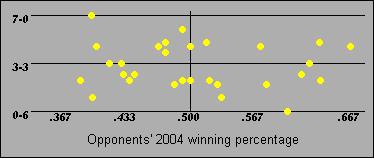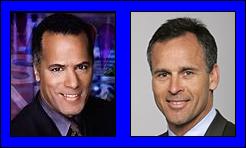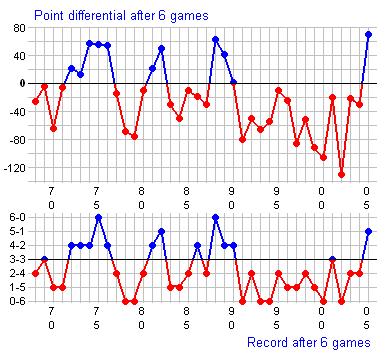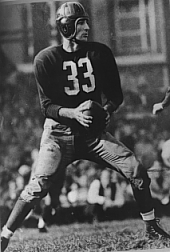
What's the worst franchise in the NFL?
I'm not asking what's the worst
team. The NFL's worst teams right now are obvious: the Houston Texans and the San Francisco 49ers. But the Texans are a brand new franchise on solid footing; their fans have started to ...
misplace their patience a little bit but certainly haven't lost it. The 49ers are at the bottom of a pit, but last year's 2-14 debacle was only their fourth losing season in 22 years.
Other teams are
bad: The Detroit Lions have been a cesspool for five years, but not because Bill Ford won't spend money. Cleveland? Weak team, strong fan support. Other franchises are
in trouble: The Minnesota Vikings are a stain on the league and an embarrassment to their community, but so often a team rots from the owner's box down, and the Vikings just switched owners. And despite it all, the Vikings
were in the playoffs last year. One could make a case for the New Orleans Saints, but so much external is happening to that team that it's impossible to judge. Yes, Tom Benson has been making noise for years about moving the team, but even relocation is not necessarily a sign of a bad franchise, as we'll discuss below. Besides, the fans have remained passionate, and the team, as middling and aimless as it has seemed in recent years, has nevertheless contended.
To qualify as the worst franchise in the NFL requires a signature combination of haplessness on the field, hopelessness in the stands and cluelessness in the front office. If this were 2001, we would have considered the Cincinnati Bengals. But it's 2005, and today one franchise stands head and shoulders below the rest of the league for its inept on-field performance, incapable management and indifferent fans. Ladies and gentlemen of the Phoenix-Tempe-Mesa corridor, the worst, saddest, most forlorn franchise in the NFL: the
Arizona Cardinals.
The Cardinals are the oldest "professional" football franchise in the country, founded in 1898 on the South Side of Chicago and named not after the adorable little bird but after the used, faded maroon jerseys they'd bought from the University of Chicago. (The shirts wouldn't be the last thing the Cardinals bought faded and secondhand.)
How long is the Cardinals' history? The Cards, along with the Packers and Bears (
nee Staleys), were in the NFL
before it was the NFL. But although they have been in the league for 85 years, they have precious little to show for it. Playoff appearances, for instance. The NFL began playing postseason games in 1933. Since then, the Cardinals have played all of
eight postseason games. Compare that with the other teams that have been in the league since '33:
TEAM | PLAYOFF
GAMES | LEAGUE
TITLES |
| Steelers | 42 | 4 |
| Packers | 40 | 9 |
| Giants | 37 | 5 |
| Redskins | 37 | 5 |
| Eagles | 32 | 3 |
| Bears | 29 | 7 |
| Lions | 17 | 4 |
| Cardinals | 8 | 1 |
Eight playoff games in 72 years? The Eagles have played 10 in the last four. The Jaguars have played eight, and they're only 10 years old. The Packers have more NFL championships than the Cards have had playoff games. The Cardinals did win an NFL title, and that deserves some respect, but ... it was in 1947. There were World War II veterans playing that year -- WWII vets still
in their twenties. That 1947 title reminds me of being at MCI Center in Washington and looking up at that sad, lonely banner from the 1977-78 NBA championship season, back when the Washington Wizards were still the Bullets. Similarly, when the Cards were NFL champs, they weren't the Arizona Cardinals, they weren't the Phoenix Cardinals, they weren't even the St. Louis Cardinals. They were still the Chicago Cardinals. They played in Comiskey Park. The
original Comiskey Park. Why Comiskey? Because the crosstown rival Bears were using Wrigley Field.
The mention of Wrigley brings back that important distinction: bad team vs. bad franchise. The longtime inhabitants of Wrigley, the Chicago Cubs, have traditionally been a dreadful baseball team yet are one of the most profitable franchises in the major leagues. The team's owner, the Tribune Co., knows that the Cubs don't have to win to make money hand over fist, because Wrigley will still be full every game, millions will still watch on WGN and merchandise will still fly out the door. Sammy Sosa wasn't valuable to the Cubs because he hit a lot of home runs; he was valuable because he moved a lot of product.
The NFL, however, doesn't have room for lovable losers. There are 12 playoff slots every year, and you have to either get one of those slots or explain to the fans what you're doing to get one in the foreseeable future. The fans will suffer through a bad season if they can see light at the end of the tunnel. But they're not going to buy any baseball B.S. about "curses." The passion of Cubs fans actually provides a financial disincentive for the Tribune Co. to field a winner. Why spend millions to build a World Series champion when the stands are already full? In the NFL, you lose year after year, and the stands get empty.
And the Cardinals
do lose year after year (after year after year). Of the past 20 seasons,
18 were losers,
one was 8-8, and one --
one -- was a winning season. That was 1998, when the Cardinals finished 9-7 and went to the playoffs as a wildcard. They won their games by 14, 3, 13, 2, 2, 3, 3, 2 and 3 points. In the playoffs, they surprised the Cowboys, to whom they had lost twice in the regular season (this is actually fairly common), before getting blown out in Minnesota. The next two years, they were back to 6-10 and 3-13. The 1998 season, clearly, was a fluke. The norm for the Cardinals is 4-12, 5-11, maybe 6-10 -- trapped in a non-stop cycle of losing, never good enough to get in sight of contention, never bad enough to get a high draft pick and start rebuilding.
The Cardinals don't rebuild anyway -- not in any traditional sense. What the Cardinals do is build for a while, see what they've got, let a few parts deteriorate or fall off, then add some vintage parts that looked great back in the day but are now just dated. Look at what happened across the league last weekend, Week 6 of the 2005 season: Buccaneers running back Michael Pittman had 157 yards against the Dolphins. Ricky Proehl caught the winning TD for the Panthers against the Lions. Broncos quarterback Jake Plummer had a 134.3 passer rating in rolling over the Patriots. All are former Cardinals. (Plummer consistently burned Patriots CB Duane Starks, another ex-Cardinal for whom New England had traded a third-round pick. How on Earth did the Cardinals ever get the best of the Patriots?)
Take a look at the Cardinals'
statistical leaders over the years. Since Neil Lomax retired after the 1988 season, the team has run a series of quarterbacks through the mill. There were QBs whose best years were ahead of them and somewhere far away from Arizona: Chris Chandler, Jake Plummer, Steve Beuerlein. There were QBs whose best years were behind them and somewhere far away from Arizona: Gary Hogeboom, Dave Krieg, Boomer Esiason, Jeff Blake. And there were QBs whose best years were, unfortunately, right then and there in Arizona: Kent Graham, Timm Rosenbach, John Navarre.
It's the same story with running backs since Ottis Anderson left after 1984. Michael Pittman and Garrison Hearst would do their best work elsewhere. Adrian Murrell and Emmitt Smith were done long before they arrived in Phoenix. Earl Farrell, Leeland McElroy and Marcel Shipp have had "career years" as Cardinals.
The personnel moves made by the team make perfect sense when you understand that the Cardinals don't sign players to win football games. The Cardinals sign players because they have to in order to qualify as an NFL team and thus get their share of the $2 billion a year the league gets from TV. That's the bottom line. And it's the bottom line, more than anything else, that defines the Cardinals as the worst franchise in the NFL.
Sports today is a business. Really, sports has always been a business, and there's nothing wrong with it. Some franchise owners (e.g. Mark Cuban) keep teams as a hobby; most, however, are in it as much for the money as for the excitement. And owners are
entitled to turn a profit. The NFL ain't a charity. But there's more than one way to do it. One is to spend some money and try to field the best team you can. By building a winner, you draw more fans, you sell more gear. You become a community asset, and you leverage that for, say, a better stadium deal or more local sponsorship dollars. You get a good return on your investment even before your share of the TV money. Think Washington Redskins or Dallas Cowboys, or even the Green Bay Packers, who, as a publicly owned corporation, can plow all profits back into the team. This is how the league as a whole is trying to operate: It takes money to make money.
The other way to show a profit is to spend as little as possible. You let your best players go, you scrimp on scouting and coaching budgets. You don't care whether you field a winning team, because all that matters is the TV contract money. Think New Orleans Saints or Minnesota Vikings or, yes, Chicago-St. Louis-Phoenix-Arizona Cardinals. And when more successful franchises build new stadiums with new revenue streams, you go screaming to the city to give
you a new stadium, or give
you better terms on that lease you just signed five years ago. And if you don't get it, you'll ... move the team.
The Bidwill family has owned the Cardinals since the team was in Chicago in the 1930s. In 1960, having been totally outclassed by the Bears, ignored by the city and humiliated on the field (7-28-1 in three years), the family moved the team to St Louis. The Cardinals enjoyed moderate success there until the mid-1970s, then slid into the toilet. By 1988, after more than a decade of forgettable play and repeated dalliances with other cities (Atlanta, Jacksonville, Baltimore, Phoenix), the team had somehow failed to convince baseball-mad St. Louis that a new football stadium should be any kind of priority. So the Cardinals packed up, again, this time for the Southwest, where they became the Phoenix Cardinals (and, in '94, the Arizona Cardinals). In a delicious piece of irony, it's been 17 years and the team is
still playing in a college stadium built in the 1950s. However, the Cardinals will move into a new retractable-roof, retractable-
field stadium in Glendale next year. It makes you want to ask the people of Maricopa County, who approved this $450 million project: Why? What has this team done to deserve this? They came to your town, started sucking and never stopped. They averaged fewer than 40,000 people a game last year. Their home games have all been blacked out since time immemorial. And you
reward them for this kind of performance?
Since 1980, besides the Cardinals, five NFL franchises have relocated. Consider:
- In 1982, the Oakland Raiders moved to Los Angeles. In 1983, they won the Super Bowl.
- In 1995, the Los Angeles Rams moved to St. Louis. In 1999, they won the Super Bowl.
- In 1996, the Cleveland Browns moved to Baltimore and became the Ravens. In 2000, they won the Super Bowl.
- In 1997, the Houston Oilers moved to Tennessee. In 1999, their first season in Nashville, the Titans reached the Super Bowl.
The fifth team, the Baltimore Colts, moved to Indianapolis in 1984. Their first decade in Indiana, they were pretty weak, but they did make the playoffs in 1987, '95 and '96 -- and came within a Hail Mary of the Super Bowl in 1995. After Tony Dungy and Peyton Manning turned the Colts into a perennial winner, the city and state got on board for a new stadium. Notice what that says, Arizona voters? The Colts got their new stadium
after they showed a commitment to winning. It will be interesting to see what the Cardinals ownership does with their new park and all the revenue that comes with it. Will they use it to become a winner? Or will they do what the Bengals' owners were accused of doing, which is line their pockets with it. Remember: Hamilton County, Ohio, which built Paul Brown Stadium in Cincinnati,
threatened to sue the Bengals in 2002, claiming that they were violating their lease by not fielding a competitive team. In 2003, Mike Brown hired the hottest head coaching prospect in the league, Marvin Lewis, and finally freed up money for coaches and scouting. And what's happening? The team's winning, the stadium is sold out for every game, the city is dressed in tiger stripes.
The Bengals are suddenly a successful franchise.
Back at Sun Devil Stadium in Tempe, Arizona, the losing continues. The 1-4 Cardinals think they might have a good chance against the 2-4 Titans this weekend, which just might be all you need to know. Coach Denny Green is trying to decide whether to stay with quarterback Josh McCown, the youngster he pulled for no good reason last year, or give the starting job back to Kurt Warner, the latest used-up vet to wash up under center in Arizona. This is the team's fourth home game of the season, but only the third in Tempe, because they willingly gave up a home date to play in Mexico City in front of a decidedly pro-49ers crowd. Why?
Muchos pesos, amigos. Their only win of the year was over the comedic 49ers. The only major additions to the team in the offseason were Warner, new uniforms and a new, fiercer bird logo (see the before and after at top of this item).
The people of Arizona built the Cardinals the stadium they've been looking for from coast to coast for decades. They're probably stuck with the team now. Perhaps the state's residents and the team can make this relationship work. But it won't be easy. Those Cards have been a selfish mate with a wandering eye. Like them, fine, but don't love them. They're incapable of loving anyone back.
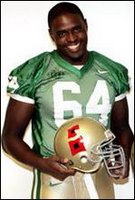 MIAMI WORE THROWBACK UNIFORMS, ostensibly to honor the all-important 38th anniversary of the 1967 Hurricanes team that went to the Bluebonnet Bowl, but really to pump up merchandise sales. So, ESPN, tell us: What team did the uniforms, seen at right, make the Hurricanes look like?
MIAMI WORE THROWBACK UNIFORMS, ostensibly to honor the all-important 38th anniversary of the 1967 Hurricanes team that went to the Bluebonnet Bowl, but really to pump up merchandise sales. So, ESPN, tell us: What team did the uniforms, seen at right, make the Hurricanes look like?

